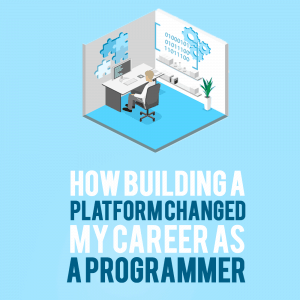
But as programmers, it’s something we hear all the time: “You need to have a niche,” “You need to stand out.” You’ve heard this before, right? Me too, constantly.
People say it’s important to have a niche and stand out because programming is a competitive industry and showcasing your ability is essential to thrive.
But, even if we agree with this idea, how do we do it? Is there a way to build a “personal brand” without feeling like you’re selling out?
The short answer is yes.
You can build a personal brand that shares your unique take and passion, helps others, brings you more fulfillment, and raises your status all in a way that doesn’t require you to hand over your soul as a shady snake oil salesman or trade in your personal life.
And it’s called having a platform.
But why am I sharing this with you today? And why should you care? Because I think it’s the single most impactful idea that I’ve found for my career. And, as you’ll see very soon, it goes much deeper than the idea of having a website or blog.
In order to leverage a platform, we will need:
- First, to know what one is, and why it matters
- To look at why many don’t consider having a platform
- And lastly, we’ll address three misconceptions about building a platform
There’s a lot to cover, so let’s get to it.
Not Just a Website—What Is a Platform?
For me, the word “platform” is frustrating, as it creates a new concept that sounds more complicated than it really is.
But, in order to discuss this topic, we really do need to generalize it as a term. And we also need to make a distinction between having a platform and just having a website.
No other term adequately encompasses all the topics that a platform covers. Which brings me to the all-important question: What is a platform?
Michael Hyatt, in his book “Platform,” defines a platform as:
“A box that you stand on to get your message to the world.”
This definition is OK. But it’s not great.
Why? Because I think it creates a knee-jerk response of: “But I don’t have a message—so maybe this concept of a platform isn’t for me.” It’s not just that it’s polarizing, because if I’m being honest, it also sounds a bit like some beauty pageant bullsh*t.
And I don’t want you to be put off, because a platform can be for everyone, not just those who identify with the idea of “having a message” (more on this later).
But I can’t leave you with just this nebulous definition.
To add some flesh to the bone of this definition, I’ll say that a platform is really comprised of your various assets (both intellectual and physical):
- Ideas
- Websites
- Books
- Meetup groups
- YouTube channels
- Podcasts
A platform is not just one of these areas. It’s not just a website, for instance. It’s all of these areas when they work together in harmony.
Society has opened up to these media in our personal lives, but we’re taking a lot longer to realize that we can use these for significant professional gain as well.
In fact, the divide between “personal” and “professional” is disappearing. I’m not saying we should all share pictures of our keg stands from the weekend on our LinkedIn profile, but the world, especially in technology and knowledge work, is starting to realize that simply being in a suit and having your butt in a chair doesn’t always lead to the best outcomes. And that instead, we should be encouraging people to “bring their full self” to work.

Having a platform is the way I take full ownership of my life, my career, and my ideas (again, more on this later).
If you’re still a little confused about what a platform really is, don’t worry. The idea of a platform isn’t always easy to grasp at first.
But we do have more ground to cover, so let’s keep at it.
Why Most Don’t ‘Get’ the Idea of a Platform
In order to truly understand this concept, we need to first address our belief systems. This might seem like an odd place to start, but you’ll see what I mean soon.
Back when I gave the definition of a platform, I said some people might not think they “have a message.”
The reason many recoil from such a statement isn’t strictly our fault. I grew up in the North of England, where many things are deemed normal. But the idea of “having a message,” or a platform, is definitely not on the list of things that any normal people do.
Platform-building is not something we’re told is a job that we can have (it can be), or that it can work to aid your career (it can), or that it can be a great way to have more fun and spend time sharing about the things you like and are passionate about.
To most, the notion of a platform is alien.
Platforms can feel alien if we believe building one is reserved for the industry “experts”—those who have achieved greatness in their lives, and the gatekeepers of the professional world have now allowed them to strike out and share their message. We end up feeling that at some point in our lives, someone will come along and tell us: “Now you are successful, you may have a platform.”
But platforms have no gatekeeper, no arbitrary benchmark to hit or certificate required.
The truth is that building a platform doesn’t start with being told that you are now given permission to do this; it starts with having the courage to just start.
Case Study: How Kyle Simpson Puts a Platform into Action
If you’re still not fully grasping the idea of a platform and how it can become a career strategy and mindset, let’s take an example: Kyle Simpson.
Kyle is the author of the book series “You Don’t Know JS.” He’s a conference speaker, an advocate of the open web, and much more. I was lucky to meet Kyle recently in London at a Meetup talk. I came to hear Kyle’s talk about Functional JavaScript, but I left with something more powerful: inspiration.
Why? Because Kyle spent the first 20 minutes ardently discussing the importance of speaking at events, writing articles, and simply getting out there as a means to connect with others and “practice in public” (a phrase I love). Kyle lives his words, as he even writes his books completely open source and available (for free!) on GitHub.
Another unique point to note about Kyle is he doesn’t have a website. Kyle prefers to deliver content in videos, podcasts, tweets, and talks—proving that platforms come in all shapes and sizes.

Why? Because Kyle has something better: He has a platform, which allows him to do what he loves on his own terms, making the impact that he desires with the audiences he chooses and on the topics that he’s curious about.
Having a platform isn’t about money, recognition, or fame as much as it is about freedom, living life on your own terms, and creating impact … yet (hardly) surprisingly, the two always seem to meet in the middle.
Misconceptions
I believe that every programmer can and should start building a platform today.
For the rest of this article, I’m going to dissect some misconceptions that I believe may be discouraging you from building a platform.
How do I know what these misconceptions are? Because they’re the exact misconceptions I had about building a platform:
- It could damage your career.
- You need to give up other hobbies/interests.
- Everything needs to be understood and planned in advance.
If you genuinely believe a platform is not for you, I highly suggest you ask yourself whether that’s the objective truth, or if it’s fear that’s doing the talking.
You really don’t want it to be the latter.
Misconception 1: It Could Damage Your Career
I was very fearful when I first started writing online. I wondered what others would think and whether the writing I put out would be rejected.
I thought maybe guys at work would tear me apart for it—or even worse, I’d get fired.
I was scared that if my writing was too provocative or read in the wrong light, something bad would happen.
How many of these bad things happened? Zero.
The counterintuitive thing is that if my writing actually did get me fired, that would be a great thing. Because in the long run, if you work somewhere that silences your ideas or opinions, then they’re holding you back.
What I didn’t realize is that the best companies don’t hold people back for building a platform; they do the opposite. These companies showcase their employees.
Why? Because it’s mutually beneficial.
Great examples of this in practice are:
Paul Irish for Google.
Or Martin Fowler for ThoughtWorks.
ThoughtWorks, for instance, is a consultancy that wants to be at the top of the industry. With their reputation, ThoughtWorks gains their clients, charges their rates, and attracts top programmers to work for them to keep their standard of service up.
For ThoughtWorks to keep their brand at the top of the industry, they need the best programmers working for them. That’s where programmers like Martin Fowler come in. With Martin’s help, ThoughtWorks is literally writing the books that every other company’s programmers are reading.
Just yesterday I bought a copy of Building Microservices by Sam Newman, and as I was flipping through the few pages, Sam mentioned that he, of course, also works for ThoughtWorks.
Platforms aren’t antithetical to a full-time software developer job—they work in harmony together.
Misconception 2: You Need to Give Up Other Hobbies/Interests
Platform-building does require time and energy. But what I’ve found is that building a platform isn’t counter to my other hobbies—instead, it seems to make them far more enjoyable.
I engage considerably more now with the books I read and the conversations I have because I’m looking at life from a different angle.
I’m not suggesting that you spend your life in a neurotic frenzy looking for the next piece of great content for your platform, but the search for content might help you to see the world through a different, more highly tuned lens.
You will start observing your colleagues, your work, your own interactions, strengths, and weaknesses on a different, more in-depth level. Searching deeper in situations, looking for the narrative in what were previously mundane everyday situations.
Austin Kleon put it best:
“You don’t want to look like your heroes, you want to see like your heroes.”
Also, I’m not claiming that a platform takes zero time; it will take work. But there are some things you can do to lessen the two biggest time sinks: initial set-up time and decision-making.
The initial set-up is a one-time thing. For instance, you might want to set up things like a website or social media pages. But if you get smart with your time and utilize tools like MailChimp and Buffer, you can automate many aspects, such as email newsletters and social posting, respectively. When you get over the initial hurdle of understanding the tools and set-up, automation can do a lot of the heavy lifting for you. And being a programmer, automation is in our blood.
The second area that steals time is decision-making, and we’ll talk about this in just a moment as part of misconception three. But we can address it here, too.
Put simply: If you alter your mentality from trying to achieve perfection, you can free up a lot of time. We often spend more time than we realize trying to make everything perfect, and trying to make the perfect decisions. When we realize that some decisions can be deferred and opt instead for exploration and experimentation, we can greatly increase our speed of execution.
Misconception 3: Everything Needs to Be Understood and Planned in Advance

I think this is something most programmers might face, too. I personally had a lot of fear of uncertainty for the future. What if I wanted to change careers? What if in a year’s time, I didn’t want to talk about programming anymore? What if I talk about a technology and then it quickly becomes outdated?
There are many ways to mitigate this risk, for instance, by building a brand around yourself as an individual as opposed to a particular technology. Or by starting small and agreeing with yourself to work first on your writing and storytelling before building your platform on a specific area.
We fail to create momentum as we try to find the perfect answer to the potentially unanswerable question: How do I ensure that the decisions I make now are risk-free? We’re searching for an answer that we might never find.
Instead, we’re better off reframing the question as: “What will I gain if I start now, as opposed to waiting?” Or, “What will I find out about myself and the platform I want to build if I simply begin?”
It makes more sense to start, and to experiment now, so that when you do have greater knowledge, confidence, or direction, you will have the skills to push yourself in the right direction.
If you are still uncertain about how much clarity you need to start, one of my favorite tools is the Wayback Machine. It allows you to go back in time and view a website in the past. This gives you an idea of the starting point of other websites or blogs.
Think of someone you admire or look up to, take their website and drop it into this tool, and go back in time to see what their beginnings looked like.
You might be surprised to see how many of the people you admire started their platforms with a half-baked idea that they later refined. Not all ideas come out fully formed, and yours doesn’t need to either.
Start Building Your Platform Today
Your platform will be beneficial to your career, I guarantee it. Along the way, you might find out interesting things about yourself, discover passions you didn’t know you had, and develop skills you otherwise wouldn’t have.
The biggest hurdle to building a platform is the lack of courage to start. In order to build this courage, we need to rewrite the narrative that says platform-building is not the norm. Because now, it is.
Terry Crews summed this up better than I ever could:
“In order to ‘have’ you must do, and in order to ‘do’ you must be.”
Everything comes from a decision to be, then from this we do the work, and then only when we have completed these two can we have the result. It is not the other way around.
If you want to have a certain result, like having a remarkable career, you must do the work that someone with a remarkable career does. And in order to do the work that someone with a remarkable career does, you must first make the decision to be that person.
First be—then do—then have.
Today, make the choice to be that person. Build your platform.
